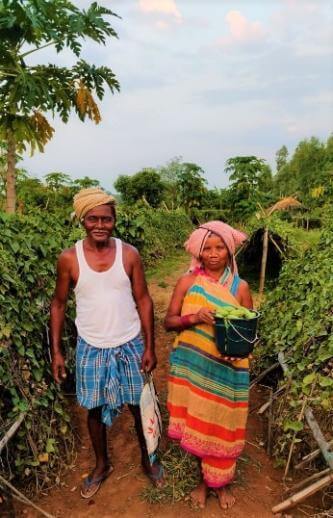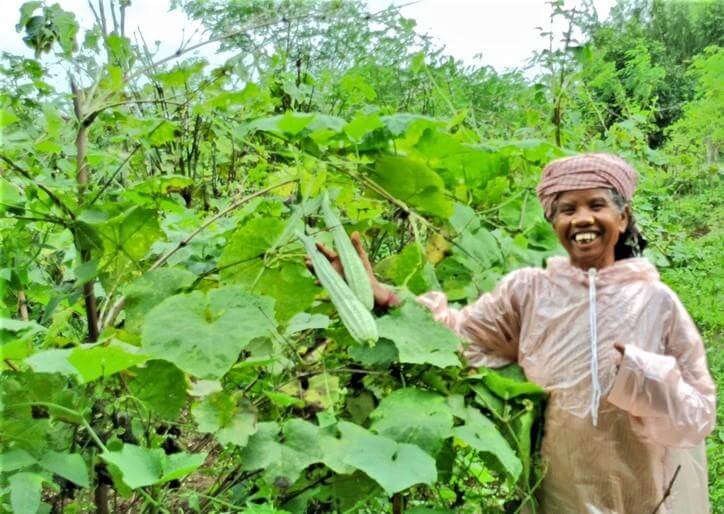Katariput is an interior village in the Bhusangaguda GP of Kundra Block of the Koraput district, which houses 41 low-income families, mainly from the Gadaba tribe. Agricultural production and livestock rearing are the only sources of income for the households. They grow vegetables, millets, paddy, and maize throughout different cropping seasons. In 2019, Harsha Trust entered the region to ensure that the local communities could increase their standard of living through multi-cropping, adopting better practices, natural farming, NPM, collective marketing and business strategies. The practice of monoculture, widespread availability of chemical fertilisers, distance from the Kundra market, and lack of market linkages were problems which mired the agricultural scenario of farmers of Katariput. Farmers had to cycle for more than 15 km to sell their agricultural products in the Kundra market. They also lacked avenues for consulting professionals/experts to seek help to sort out these issues.
Introducing the Concept of Sustainable Farming
To begin with, our team had a meeting with the community to suggest that their livelihood would be promoted through mixed cropping, inter-cropping and livestock rearing. Then, a survey of the community’s residents was conducted, and a brief profile of each household was collected, wherein Asmati Gadaba was selected as a beneficiary. Further, we identified that certain practices followed her regarding agriculture and livestock rearing could be enhanced or modified for better returns. Then, we assessed her family’s financial situation.
Challenges of Subsistence Farming
Asmati Gadaba is a farmer whose family owns 3 acres of land. When Harsha Trust started working with her in 2019, she used to cultivate paddy on 2 acres of land in Kharif and Rabi seasons using traditional farming techniques, harnessing water from the flood irrigation of the Kolab dam. Her remaining 1 acre of land lay unused. She also used to rear backyard poultry. Her family earned ₹ 28,000 per year from these two sources of income.
Commercial Vegetable Farming – Adopting Sustainable Farming Practices

Harsha Trust formed the Mahalaxmi Producer Group to provide technical know-how (seedbed formation, seed treatment, soil treatment, etc.), provide agricultural inputs, and form backward and forward linkages for female farmers by promoting vegetable farming. We assisted her in carefully choosing winner crops based on the cropping seasons. Further, we facilitated training and orientation on PoP, preparation and use of NPM manure for pest management, demonstration for seed treatment, seedbed preparation and line transplanting. Furthermore, we enrolled her in an FPO named- ‘Nari Pragati Producer Company Limited’ as a shareholder (Share capital deposited: ₹ 500) to foster market linkage for the sale of vegetables grown her.
After Harsha Trust’s intervention, Asmati’s knowledge enhanced on cultivating vegetables round the year with effective disease and pest management through natural farming practices like Handikhata, Agneyastra, humic acid, straw mulching, etc. She also ensured judicious use of fertilisers with creepers as well as standing crops, adopted the mix and inter-crop in pointed gourd and vegetables, selected two winner crops season-wise and cultivated them in systematic ways. Her knowledge of institution building developed as she participated in training and awareness programs, being an integral part of the PG and FPO.
Impressive Economics of the Vegetable Farm
As a result, she has received ₹ 1.2 lakhs from pointed gourd and 0.75 lakhs from ivy gourd crop in a year and continues to harvest and sell 1.5-2 quintals of those vegetables per week. Now, she sells vegetables once a week to the FPO, which collects her produce for sale. She expressed her happiness about selling her products without having to travel to Kundra and consuming fresh organic vegetables from her home-grown farm.

Way Forward
This year, as Asmati adopted natural biomass straw mulching, she saved more than ten days of labour as she didn’t have to do the weeding. Asmati acknowledged that her financial status is continuously growing, supported by different Harsha Trust interventions. However, convincing the farmers to shift from conventional farming methods to systematic methods of NPM and Natural Farming has been an uphill task and a work in progress. After continuous engagement with them, it is rewarding to witness them reap the benefits of Natural Farming and NPM, one farmer at a time. In another 1-2 years, this model could gradually be replicated and become self-sustaining by the end of the project period. Establishing assured irrigation sources and infrastructure, such as a borewell or dug well, can reduce the issue of water scarcity during the non-flood seasons.
